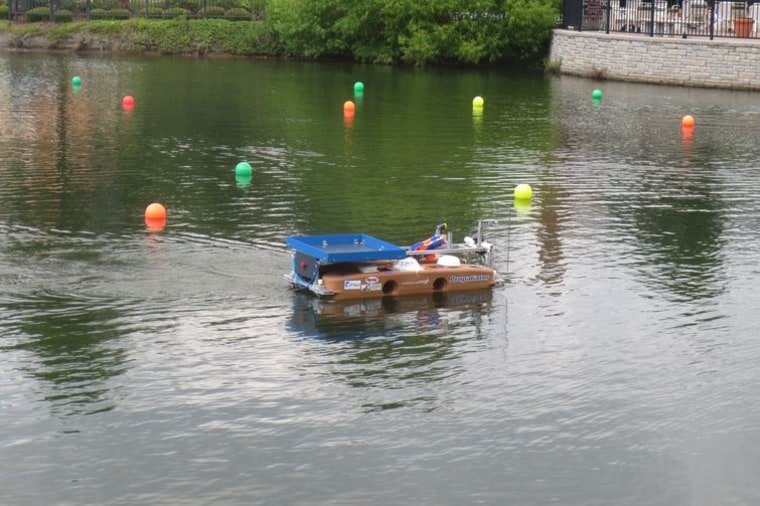For all the anxiety and sleep deprivation they caused, the robotic boats plying a Virginia pond this past week might as well as have been carrying nuclear bombs instead of soft-foam projectiles to shoot through hula hoops in a bid for extra points.
"We're talking Cuban missile crisis stress level," Andrew Gray, an exhausted and slap-happy graduate student in the Machine Intelligence Laboratory at the University of Florida, told NBC News on Sunday after his team took top prize in the 2013 International Roboboat Competition at a pond at the Founder's Inn & Spa in Virginia Beach, Va.
Gray, the team leader, said he personally put in more than 1,200 hours of time designing, programming and building the Propagator Autonomous Surface Vehicle, the university's first entry to the annual competition run by Association for Unmanned Vehicle Systems International.
All told, the team put in about 5,000 hours over eight months, including nearly around-the-clock scrambling during the seven-day competition as they dealt with a broken motor and strategic planning over whether or not to deploy a little-tested quadcopter to retrieve a Velcro-covered hockey puck.
The puck was the goal in one of five optional challenges the robotic boats could undertake after successfully navigating through a series of buoys. "We decided not to do it, and it was good choice," Gray said.
That's because the team from Embry Riddle Aeronautical University, which had a tested quadcopter and sizeable buzz surrounding its robotic boat, ran into difficulties navigating the course and was unable to attempt the amphibious dock challenge.
Embry-Riddle's downfall allowed the University of Florida to glide into first place.
Autonomous robots
The robotic boats compete autonomously, without any remote controls. Once set free, all the team members can do is sit back and hope for the best. "It is like parents watching their kid play soccer," said Gray. "They can sit on the sidelines and be nervous, but they can't really interact."
The boats entered are varied, having only to meet weight and size limitations.
"Because we don't give them a kit, because we basically allow them to approach this however they want to, there is an element of creative problem-solving that factors in," Daryl Davidson, executive director of the Association for Unmanned Vehicle Systems International, explains in the introductory video below.
The lack of rules, noted Gray, gives the competition an innovative and artsy flair as well as an element of "fun" that is absent the traditional classroom setting of "books and homework and tests."
Ten years from now, he added, these boats will likely seem laughable given the current pace of robotics technology. But for now, they are sophisticated — albeit delicate — machines that take lots of time to build and nail-biting stress to watch.
"It was hot and people were dehydrated and I hadn't eaten anything," he said of the Sunday finals. "I was so nervous I wasn't even hungry. I was shaking and exhausted. And when we were finally done, it was just complete stress relief and it was just great."
John Roach is a contributing writer for NBC News. To learn more about him, visit his website.
